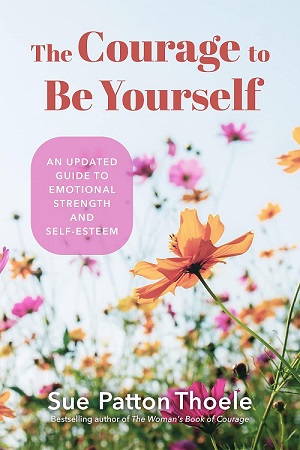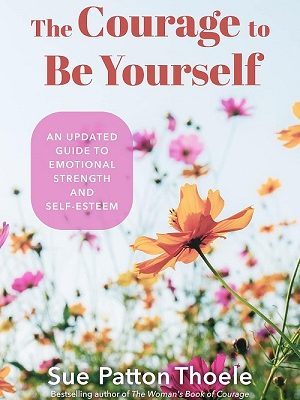The Courage to Be Yourself: An Updated Guide to Emotional Strength and Self-Esteem by Sue Patton Thoele is a transformative guide for individuals seeking to enhance their self-esteem, emotional resilience, and ability to live authentically. Thoele shares insights and practical strategies for embracing one’s true self while navigating societal pressures, personal challenges, and self-doubt. Below are the lessons from the book:

Read: When Making Others Happy Is Making You Miserable
1. The Importance of Self-Acceptance
Sue Patton Thoele starts by highlighting that self-acceptance is the foundation of emotional strength and self-esteem. The journey toward self-acceptance begins with acknowledging both your strengths and weaknesses without harsh judgment.
Key Lesson: Embrace Who You Are
- Lesson: Accepting yourself fully, including your flaws, is essential for building self-esteem.
- Takeaway: Self-acceptance allows you to let go of the need for external validation and fosters a sense of inner peace and confidence.
- Actionable Tip: Start by practicing self-compassion. When negative self-talk arises, reframe your thoughts by focusing on what you appreciate about yourself.
2. Understanding the Influence of Conditioning
Many of our beliefs about ourselves stem from early conditioning—the messages we received from family, friends, and society. Thoele teaches that identifying and challenging these conditioned beliefs is crucial for emotional growth.
Key Lesson: Break Free from Limiting Beliefs
- Lesson: The beliefs you’ve absorbed from others can limit your self-esteem and hinder your personal growth.
- Takeaway: Becoming aware of how past conditioning shapes your self-perception is the first step to reclaiming your authentic self.
- Actionable Tip: Journal about the limiting beliefs you hold about yourself. Reflect on where these beliefs come from and begin questioning their validity.
3. The Power of Boundaries
Setting boundaries is a central theme in the book. Thoele stresses that boundaries are not about pushing others away but rather about creating a safe space for yourself. By establishing clear boundaries, you protect your emotional well-being and ensure that you don’t overextend yourself for others.
Key Lesson: Healthy Boundaries Empower You
- Lesson: Boundaries help you define what is acceptable in your relationships and interactions, safeguarding your emotional health.
- Takeaway: Setting boundaries is a form of self-respect. It prevents burnout and resentment, ensuring you can give to others without losing yourself in the process.
- Actionable Tip: Identify one area in your life where you feel overextended or taken advantage of. Practice setting a small, firm boundary in that situation and stick to it.
4. Cultivating Emotional Resilience
Emotional resilience is the ability to bounce back from setbacks and challenges. Thoele emphasizes the importance of building resilience through mindfulness, self-care, and maintaining a balanced perspective during difficult times.
Key Lesson: Emotional Resilience Is a Skill You Can Develop
- Lesson: By fostering emotional resilience, you can navigate life’s ups and downs without becoming overwhelmed by stress or negative emotions.
- Takeaway: Emotional resilience gives you the strength to face challenges with grace and confidence.
- Actionable Tip: Incorporate mindfulness practices, such as meditation or deep breathing, into your daily routine to help manage stress and build resilience.
5. The Role of Self-Compassion
Thoele underscores the necessity of self-compassion, which involves treating yourself with kindness and understanding when things go wrong. Self-compassion helps counteract feelings of inadequacy and allows you to recover from mistakes or failures without harsh self-criticism.
Key Lesson: Treat Yourself with the Same Compassion You Show Others
- Lesson: Practicing self-compassion improves self-esteem and emotional strength by replacing self-judgment with understanding.
- Takeaway: You don’t have to be perfect to be worthy of love and respect—especially your own.
- Actionable Tip: The next time you make a mistake, speak to yourself as you would a close friend. Offer words of kindness and reassurance instead of criticism.
6. The Courage to Be Authentic
Being authentic means living in alignment with your true self, rather than conforming to others’ expectations. Thoele encourages readers to have the courage to be themselves, even when it feels uncomfortable or risky.
Key Lesson: Authenticity Leads to Emotional Freedom
- Lesson: By being true to yourself, you free yourself from the burden of trying to please others or live up to societal norms.
- Takeaway: Authenticity may not always be easy, but it’s essential for creating a life of integrity and fulfillment.
- Actionable Tip: Practice small acts of authenticity, such as expressing your true opinions or pursuing activities that genuinely interest you, even if others might disapprove.
7. Letting Go of Perfectionism
Perfectionism can be a major obstacle to self-esteem and emotional well-being. Thoele explains that letting go of the need to be perfect allows you to embrace your imperfections and accept that being “good enough” is often more than sufficient.
Key Lesson: Perfectionism Is the Enemy of Growth
- Lesson: Striving for perfection sets unrealistic standards and leads to feelings of failure and inadequacy.
- Takeaway: Letting go of perfectionism frees you to take risks, make mistakes, and grow as a person.
- Actionable Tip: The next time you find yourself obsessing over doing something perfectly, intentionally allow yourself to complete it “good enough” and observe how it feels.
8. The Value of Emotional Honesty
Thoele advocates for emotional honesty, which involves being truthful with yourself and others about how you feel. Emotional honesty helps you develop deeper, more authentic connections and prevents you from bottling up emotions that can lead to stress and resentment.
Key Lesson: Emotional Honesty Deepens Relationships
- Lesson: Being open and honest about your feelings fosters trust and intimacy in relationships.
- Takeaway: Hiding your true emotions can strain relationships, while emotional honesty builds stronger, healthier connections.
- Actionable Tip: Start practicing emotional honesty by expressing your feelings in a gentle, non-confrontational way with someone you trust.
9. The Impact of Positive Self-Talk
Our internal dialogue has a profound impact on our self-esteem. Thoele teaches that positive self-talk is a powerful tool for improving self-confidence and emotional strength. Replacing negative thoughts with affirming, supportive ones can shift your mindset from one of self-doubt to self-belief.
Key Lesson: Your Thoughts Shape Your Reality
- Lesson: By cultivating positive self-talk, you can change the way you perceive yourself and your abilities.
- Takeaway: Positive self-talk empowers you to face challenges with confidence and resilience.
- Actionable Tip: Create a list of positive affirmations related to your self-worth and repeat them daily to reinforce a healthy mindset.
10. Navigating Fear and Taking Risks
Fear often holds people back from living fully and authentically. Thoele discusses how to navigate fear and take risks, explaining that facing your fears is essential for growth and self-discovery.
Key Lesson: Fear Is a Natural Part of Growth
- Lesson: Everyone experiences fear, but learning to move through it is key to personal and emotional growth.
- Takeaway: Courage isn’t the absence of fear, but the willingness to act despite it.
- Actionable Tip: Identify one fear that’s holding you back and take one small step toward confronting it. Build on these small wins to increase your confidence.
Conclusion
The Courage to Be Yourself by Sue Patton Thoele is a guide to building emotional strength, self-esteem, and authenticity. The lessons emphasize self-acceptance, setting boundaries, practicing self-compassion, and letting go of perfectionism. Thoele encourages readers to embrace their true selves and live a life aligned with their values, free from the need for external validation or approval (Amazon).



